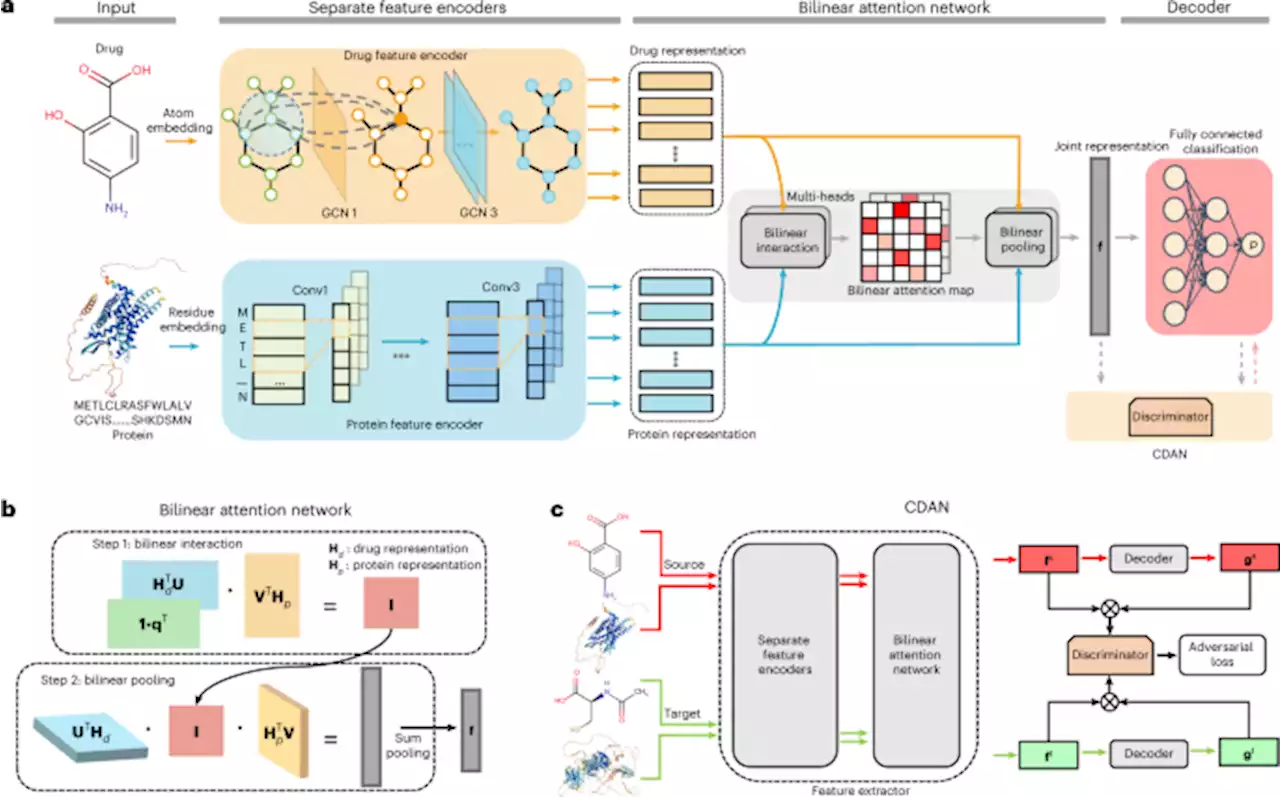AI could speed up discovery of new medicines sheffielduni NatMachIntell
Predicting drug–target interaction is key for drug discovery. Recent deep learning-based methods show promising performance, but two challenges remain: how to explicitly model and learn local interactions between drugs and targets for better prediction and interpretation and how to optimize generalization performance of predictions on novel drug–target pairs.
Here, we present DrugBAN, a deep bilinear attention network framework with domain adaptation to explicitly learn pairwise local interactions between drugs and targets, and adapt in response to out-of-distribution data. DrugBAN works on drug molecular graphs and target protein sequences to perform prediction, with conditional domain adversarial learning to align learned interaction representations across different distributions for better generalization on novel drug–target pairs.
United Kingdom Latest News, United Kingdom Headlines
Similar News:You can also read news stories similar to this one that we have collected from other news sources.
 Updated Ventum GS1 Review: A Ready, Set, Gravel Race MachineIs the new Ventum GS1 the ideal consumer-direct gravel race bike? Jordan digs in to find out how it compares.
Updated Ventum GS1 Review: A Ready, Set, Gravel Race MachineIs the new Ventum GS1 the ideal consumer-direct gravel race bike? Jordan digs in to find out how it compares.
Read more »
 ICG-backed With Intelligence plots raid on MJ Hudson armThe Intermediate Capital Group-backed business is among the bargain-hunters circling divisions of the troubled asset management services provider, Sky News understands.
ICG-backed With Intelligence plots raid on MJ Hudson armThe Intermediate Capital Group-backed business is among the bargain-hunters circling divisions of the troubled asset management services provider, Sky News understands.
Read more »
 Man charged after woman in 60s 'robbed at Asda cash machine'A man has been charged after a woman in her 60s was allegedly robbed at a cashpoint in the Asda Watford car park.
Man charged after woman in 60s 'robbed at Asda cash machine'A man has been charged after a woman in her 60s was allegedly robbed at a cashpoint in the Asda Watford car park.
Read more »
 Israel president uses ChatGPT artificial intelligence to write part of major speechIsrael has a reputation for producing a disproportionate number of tech start-ups and unicorns, with Isaac Herzog using his speech to reinforce that robots are not about to take over jobs from humans.
Israel president uses ChatGPT artificial intelligence to write part of major speechIsrael has a reputation for producing a disproportionate number of tech start-ups and unicorns, with Isaac Herzog using his speech to reinforce that robots are not about to take over jobs from humans.
Read more »
 Deletion of SNX9 alleviates CD8 T cell exhaustion for effective cellular cancer immunotherapy - Nature CommunicationsThe efficacy of T-cell-based cancer immunotherapies can be compromised by T cell exhaustion. Here the authors develop a human ex vivo exhaustion model and, based on a CRISPR-Cas9 screen, identify SNX9 as a regulator of T cell exhaustion, showing that SNX9 knockout is associated with improved T cell function and anti-tumor activity in preclinical cancer models.
Deletion of SNX9 alleviates CD8 T cell exhaustion for effective cellular cancer immunotherapy - Nature CommunicationsThe efficacy of T-cell-based cancer immunotherapies can be compromised by T cell exhaustion. Here the authors develop a human ex vivo exhaustion model and, based on a CRISPR-Cas9 screen, identify SNX9 as a regulator of T cell exhaustion, showing that SNX9 knockout is associated with improved T cell function and anti-tumor activity in preclinical cancer models.
Read more »
 Prince of Wales fund: Salisbury Plantlife charity given £390,000The grant will help Wiltshire based charity Plantlife research and protect nature in local areas.
Prince of Wales fund: Salisbury Plantlife charity given £390,000The grant will help Wiltshire based charity Plantlife research and protect nature in local areas.
Read more »
